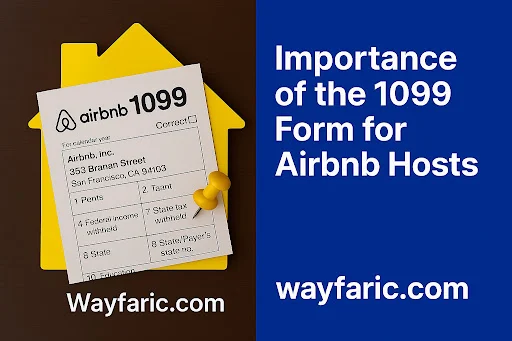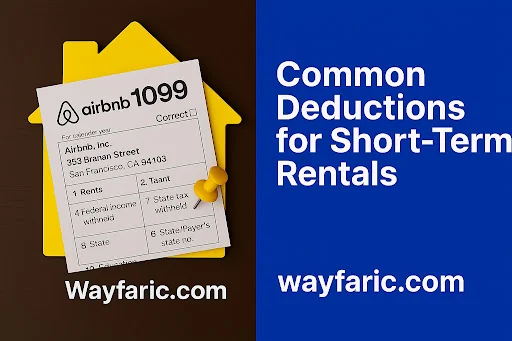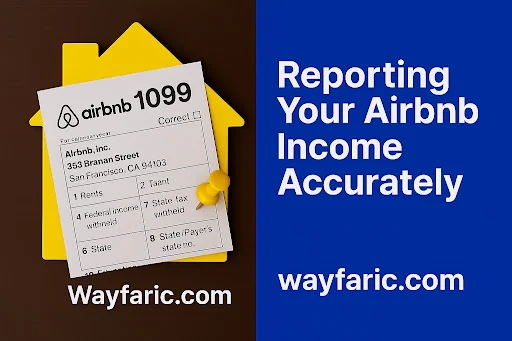Wayfaric: Fuel your wanderlust. Travel inspiration, adventure guides, and tips for your next great escape.
Featured
- Get link
- X
- Other Apps
Understanding Your Airbnb 1099: Essential Tips for Hosts to Maximize Tax Benefits
Understanding Your Airbnb 1099: Essential Tips for Hosts to Maximize Tax Benefits
What is an Airbnb
1099 Form?
The Airbnb 1099 form serves as an important tax document provided to hosts who have generated income through the platform. It outlines the total earnings you’ve accumulated over the course of the tax year, playing a key role in meeting reporting standards set by the Internal Revenue Service (IRS). This form assists the IRS in tracking and verifying income declarations on your tax return. Gaining clarity on how the 1099 works is an essential part of handling your responsibilities as an Airbnb host efficiently.
The 1099 form comes in two varieties: the 1099-K and the 1099-MISC. The 1099-K is issued to hosts who have completed at least 200 transactions and earned more than $20,000 in a calendar year. On the other hand, the 1099-MISC is issued for other types of income, such as referral bonuses or other payments that do not fall under the rental income category. Knowing which form you receive is essential for accurate tax reporting.
When you receive a 1099 form, it signifies that the income earned must be reported on your tax return. Neglecting to do so can lead to fines and interest imposed by the IRS. To stay ahead, it's crucial to maintain accurate records of all rental income and related expenses throughout the year. Being informed about the purpose and impact of the 1099 form helps you take control of your financial responsibilities and steer clear of unexpected tax issues.
Importance of the 1099 Form for Airbnb Hosts
In addition to reporting your earnings, the 1099 form can serve as a valuable tool for uncovering potential tax deductions tied to your rental activity. Having a clear understanding of the income listed allows you to effectively monitor property-related expenses such as maintenance, utility bills, insurance premiums, and mortgage interest. Keeping thorough records of these costs can lead to substantial savings by decreasing your taxable income and minimizing the amount you owe during tax season.
Additionally, having an accurate 1099 form simplifies the tax filing process. When you have a clear record of your income, it becomes easier to complete your tax return accurately and on time. This can save you a lot of stress and potential financial penalties. Keeping organized records and understanding the importance of the 1099 form will ensure that you are well-prepared for tax season and can maximize your tax benefits as an Airbnb host.
Key Tax Benefits for Airbnb Hosts
One of the key financial perks of hosting on Airbnb is access to a range of tax deductions. The IRS permits hosts to write off specific costs associated with maintaining a rental space, helping to lower your overall taxable income. By taking advantage of these incentives, you can retain more of your revenue and boost the profitability of your hosting efforts.
A particularly impactful deduction involves claiming a portion of your mortgage interest and property taxes. If you're renting out part of your home, you can calculate these costs based on the space used for hosting. This approach can lead to meaningful savings, especially for homeowners with larger mortgage obligations.
Another key benefit is the ability to deduct operating expenses. These can include cleaning fees, maintenance costs, utility bills, and even supplies for your guests. Keeping detailed records of these expenses is crucial, as they can add up quickly and provide substantial tax relief. Additionally, if you use your personal vehicle for rental-related activities, you may be able to deduct mileage and associated costs.
Depreciation is another powerful tax benefit available to Airbnb hosts. The IRS allows you to depreciate the cost of your property over a specific period, which can provide a significant tax deduction each year. This benefit is particularly valuable for hosts who have invested in renovating or upgrading their rental property. By taking advantage of these key tax benefits, you can improve your financial outcomes and ensure that your Airbnb hosting is as profitable as possible.
Common Deductions for Short-Term Rentals
One of the most common deductions is for repairs and maintenance. Any expenses incurred to keep your rental property in good condition can be deducted. This includes costs for fixing appliances, plumbing repairs, or even landscaping. It’s important to distinguish between repairs, which are deductible, and improvements, which must be capitalized and depreciated over time.
Utilities are another significant deduction for Airbnb hosts. If you provide utilities such as electricity, water, gas, or internet for your guests, these costs can be deducted. The key is to allocate these expenses accurately if you are also using the property for personal purposes. Keeping detailed records and receipts will ensure that you can substantiate your deductions if questioned by the IRS.
Advertising and marketing expenses are also deductible. If you pay for online listings, professional photography, or other marketing efforts to promote your rental, these costs can be claimed as deductions. Additionally, any fees paid to Airbnb for listing your property or for guest services can also be deducted. By taking advantage of these common deductions, you can reduce your taxable income and keep more of your rental earnings.
How to Read Your Airbnb 1099 Form
The first section you’ll notice is the payer’s information, which in this case is Airbnb. This includes Airbnb’s name, address, and taxpayer identification number (TIN). Directly below this, you’ll find your information as the recipient, including your name, address, and TIN. It’s critical to verify that all this information is accurate to avoid any issues with the IRS.
The next important section is the numbered boxes, which report various types of income. For example, Box 1 on the 1099-K form reports the total gross amount of payments you received during the year. This figure includes all the rental income before any fees or expenses are deducted. On the 1099-MISC form, Box 7 reports non-employee compensation, which could include referral bonuses or other payments.
Finally, the form may include additional information such as state income tax withheld, which will be relevant if Airbnb has withheld any state taxes on your behalf. Carefully review these sections to ensure that all the reported amounts match your records. If you spot any discrepancies, contact Airbnb immediately to get them resolved. Accurately reading your 1099 form will help you report your income correctly and avoid any potential issues with the IRS.
Reporting Your Airbnb Income Accurately
After confirming your rental income, it’s time to include it in your tax filing. Typically, Airbnb hosts report this earnings information using Schedule E (Supplemental Income and Loss) attached to Form 1040. This section is designated for income and expenses related to rental properties. You’ll enter your gross rental income, then deduct any eligible expenses—such as maintenance, utilities, or supplies—to calculate your net rental profit or loss for the year.
It’s important to keep detailed records of all your income and expenses throughout the year. This includes not only the amounts received and spent but also supporting documentation such as receipts, invoices, and bank statements. Proper documentation will help you substantiate your claims if the IRS ever questions your tax return. By accurately reporting your Airbnb income, you can ensure that you are in compliance with tax laws and take full advantage of the tax benefits available to you.
State-Specific Tax Considerations for Airbnb Hosts
One of the key state-specific considerations is the applicability of state income tax. Not all states have an income tax, but if you operate in a state that does, you will need to report your rental income on your state tax return. This may involve additional forms and schedules, so it’s important to familiarize yourself with your state's requirements and deadlines.
Sales tax and occupancy tax are other significant considerations for Airbnb hosts. Many states require short-term rental hosts to collect and remit these taxes on behalf of their guests. The rates and rules for these taxes vary widely, so it’s essential to check with your state’s tax authority to determine your obligations. Failure to collect and remit these taxes can result in penalties and interest charges.
Additionally, some cities and municipalities have their own regulations and taxes for short-term rentals. These local rules can include permitting requirements, zoning restrictions, and additional taxes. Staying informed about these local regulations is crucial for avoiding fines and ensuring that your rental business operates smoothly. By understanding and complying with state and local tax laws, you can avoid legal issues and maximize your tax benefits as an Airbnb host.
Tips for Organizing Your Financial Records
Organizing your financial records is essential for accurate tax reporting and maximizing your tax benefits as an Airbnb host. Keeping well-organized records will save you time and stress during tax season and help you substantiate your deductions if the IRS ever audits your return. Here are some tips for effectively organizing your financial records.
Begin by setting up a reliable method for organizing your financial records. This could be as straightforward as using a spreadsheet, investing in accounting software, or even blending both tools to suit your workflow. The goal is to keep a centralized log of all monetary transactions tied to your rental property—covering everything from the income you earn to expenses like repairs, utilities, and other hosting-related costs.
Next, keep all your receipts and invoices organized and easily accessible. You can use physical folders or digital storage solutions such as cloud-based services to store these documents. Label each receipt and invoice with the date and a brief description of the expense. This will make it easier to match your records with your bank statements and 1099 form when it’s time to file your taxes.
Make it a habit to periodically review and refresh your financial documentation—ideally once a month. Keeping your accounts balanced helps you spot any inconsistencies early, while maintaining accurate records throughout the year. This forward-thinking strategy will simplify your workload during tax season and enable you to claim any applicable deductions or credits as an Airbnb host. Staying methodical and on top of your finances means you can breeze through tax filing without unnecessary stress.
Resources for Tax Preparation and Filing
One of the most accessible resources is the IRS website, which offers a wealth of information on tax rules and regulations. The site provides detailed instructions for completing tax forms, including Schedule E for rental income. Additionally, the IRS offers various publications that cover specific topics related to rental properties and deductions. Taking the time to review these resources can help you better understand your tax obligations and ensure that you are taking advantage of all available deductions.
Tax preparation software is another valuable resource for Airbnb hosts. Programs such as TurboTax, H&R Block, and TaxAct offer user-friendly interfaces and step-by-step guidance for completing your tax return. These software solutions often include features specifically designed for rental property owners, making it easier to track your income and expenses and claim the appropriate deductions. Many of these programs also offer additional support, such as access to tax professionals who can answer your questions.
If you prefer personalized assistance, consider working with a tax professional who specializes in rental properties or short-term rentals. A qualified accountant or tax advisor can provide expert guidance on your specific tax situation and help you navigate any complexities. They can also assist with tax planning strategies to optimize your tax benefits and ensure that you remain compliant with all federal, state, and local tax regulations. By leveraging these resources, you can confidently manage your tax obligations and maximize your tax benefits as an Airbnb host.
Conclusion: Maximizing Your Tax Benefits as an Airbnb Host
To wrap things up, it’s essential for Airbnb hosts to thoroughly understand and properly handle their 1099 form to make the most of potential tax advantages. Getting familiar with the form's details ensures that income is reported accurately and allows hosts to benefit from numerous deductions—including those specific to short-term rentals and any additional state-level requirements. A strong grasp of these tax nuances can simplify the reporting process and enhance financial outcomes.
Equally important is maintaining organized and precise financial records. Tracking income and expenses throughout the year not only eases the burden of tax filing but also provides solid documentation should the IRS require verification. Turning to trusted tools like the IRS website, reliable tax software, or expert guidance from tax professionals can offer critical support and peace of mind.
A proactive stance toward tax management helps hosts stay in line with regulations and retain more of their earnings. Whether you’ve been hosting for years or are just getting started, understanding how tax reporting works is a key factor in ensuring smooth operations. With the proper resources and a sound strategy, you’ll be well-equipped to handle your tax responsibilities and reap the financial rewards that come with informed hosting.
Popular Posts
Discover East Carolina University: A Comprehensive Guide to Your Campus Tour Experience
- Get link
- X
- Other Apps
Unlocking Travel Savings: How to Easily Reach Expedia's 800 Phone Number for Hassle-Free Booking!
- Get link
- X
- Other Apps










Comments
Post a Comment